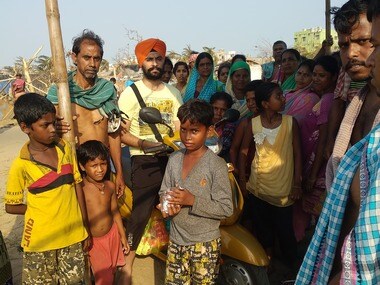By the late evening of 10 May, exactly a week after Cyclone Fani hit coastal Odisha, power supplies were back in many localities of Bhubaneswar. Residents of the city have been receiving municipality water regularly as well. Life is limping back to normalcy.
However, 60 kilometres away, Puri town, that has been worst hit by this cyclone, will likely have to wait for a few more days for electricity. In Puri town alone, many marriage receptions after the cyclone have been put on hold in view of the situation.
Cyclone Fani is an unusual one, as the state generally experiences cyclones in the October-November period.
In the rural pockets in several badly-affected blocks in Khordha and Puri districts, chances of power supply restoration look slim at least for another couple of weeks. However, rural areas are better off as far as access to drinking water is concerned. People depend on the open wells and tube wells. Even before Fani, these sources catered to the residents’ needs.
Former headmaster Bijoy Kishore Mohanty and his headmistress wife, Kumud Kumari, who have been living in Puri’s SCS College locality for over five decades, have temporarily moved to their village Bagalpur, which is 65 kilometres away, in Balipatna block of Khordha district.
“For several days after the cyclone, we had to carry water from a tubewell, 100 metres away from my place. Carrying water for all domestic use in this heat is a terrible experience,” says Mohanty. “Puri is a lovely place to stay. But when the fury of Fani gained momentum, I thought the city was going to meet its end that very day. Never in my life have I experienced, nor did I imagine, such miseries in Puri. Here in my village, at least I don’t have to bother about water,” he adds.
Kumud Kumari says, “We are still in shock. The city has lost everything.”
On the Bhubaneswar-Puri highway, unmindful of the terrible heat, civic authorities are seen working hard to erect electric polls, while scores of trucks loaded with relief materials are moving towards Puri and other routes off the highway. Municipality carriages are busy clearing garbage from roadsides.
In Puri, which is always bustling with visitors, Bada Danda (grand road) that connects the Jagannath temple with the “deities’ aunt’s place”, Mausima temple, has a deserted look. Most shops are closed, as there is no electricity.
Puri is the most well-known tourist destination in Odisha. On a daily basis, several thousand people from different parts of the country visit the city, where the main attractions, among others, are the Jagannath temple and the beach.
A large stretch along the Puri beach, which normally witnesses crowds throughout the year, is unusually empty. The numerous hotels along the road are closed.
Around 500 metres ahead on the beach stands the Light House, and behind it is Baliapanda. Around 250 men, women and children are sitting in the shade of a wall. A few feet away are the completely ravaged kuccha houses they lived in. Some are still trying to gather whatever material they can from under the rubble.
According to them, approximately six hundred families reside in the Binayak Sahi, Behera Sahi, Shiva Shakti Sahi and Santoshi Sahi here. Most of the residents depended on their makeshift shops on the beach for a living. Fani destroyed their houses as well as their livelihood.
At a little before 3 in the afternoon, a chhota hathi, (small goods carrier vehicle) arrives with packaged cooked food. The men and women are angry, they have decided not to receive the food packets provided by the government. “Last night, they had come with food packets sometime before midnight. Today, it’s already three. Does the government want us to live on an empty stomach till odd hours?,” asks a visibly agitated Tuni Sahoo (45). Others echo her sentiments
However, some children don’t obey the order. They receive and open the packets. There is khichri inside. They don’t eat. A couple of them throw the food by the road side. The person in charge of distribution pleads, but no one budges.
“We need dry items, like chidva (puffed rice) and sugar so that we can eat whenever hungry. The government should provide biscuits for the children, and essential items like candles,” says Sangita Jena. “If you pack hot cooked food inside packets, in this hot and humid condition, it goes stale within hours. Even if we receive the packets, we can’t eat the food in the night,” adds Jena.
“We have access to water facility here. What we require urgently is polythene sheets, so that we can protect ourselves from the scorching sun. You can’t imagine the condition of the over one thousand children. Unfortunately, the government doesn’t understand our plight,” complains Chandu Nayak, a resident of one of the bastis here.
According to the women, the residents of the locality had approached the local councilor, and had also submitted their applications to the officers at the municipality office, and some senior officers in the District Collector’s office, but to no avail yet.
However, an employee at the Puri Municipality says, “We have been providing all essential commodities to the cyclone victims in all the places of Puri. Vehicles carrying them are constantly on the move. Hopefully, those who claim not to have received the sheets will get them in a couple of hours.”
At the basti, an announcement is subsequently made that a vehicle carrying polythene sheets will reach them in some time. Many of the upset residents of these four sahis in Baliapanda believe that perhaps the government has finally heard their requests. Some, however, think otherwise. “Only after they reach here will we be satisfied. There is no need for false hopes to be raised before that,” they say.


